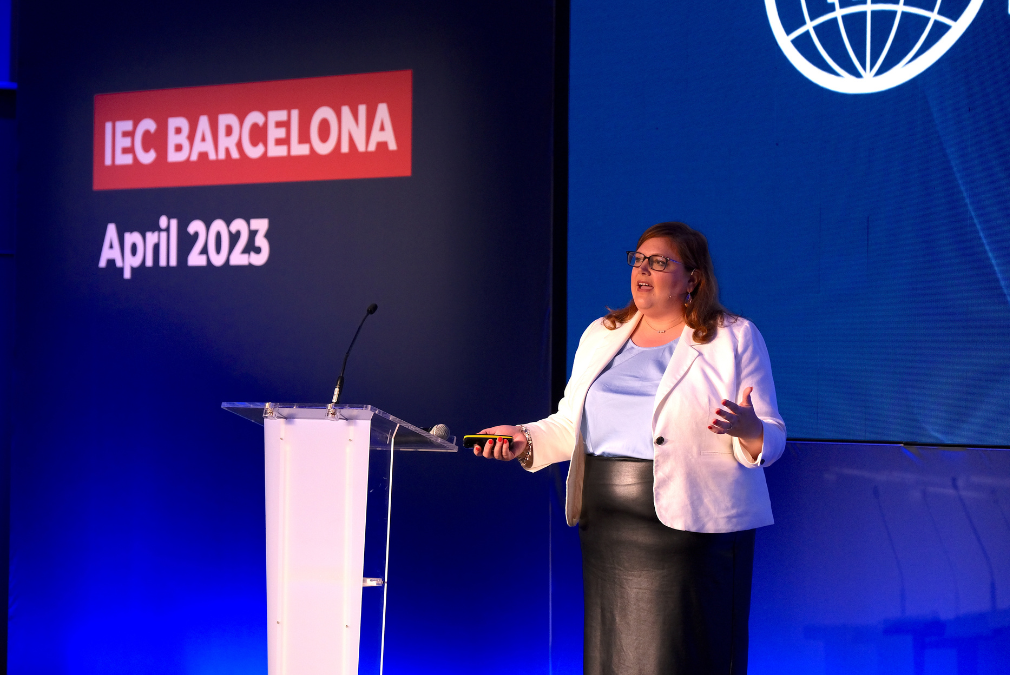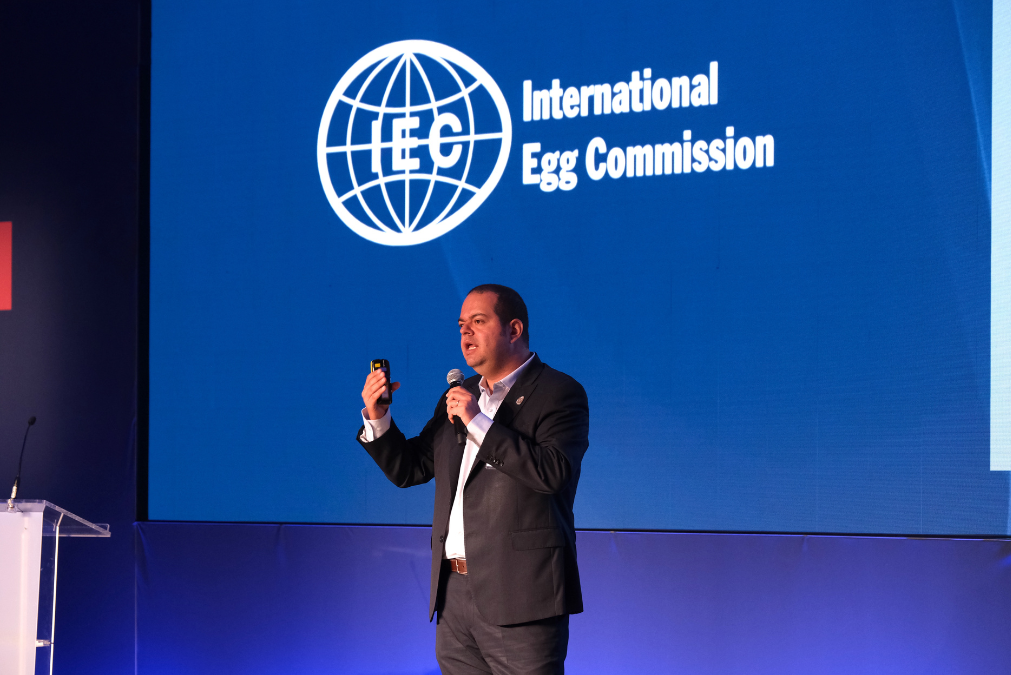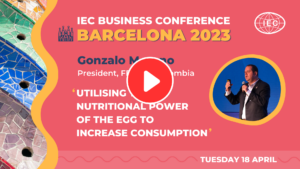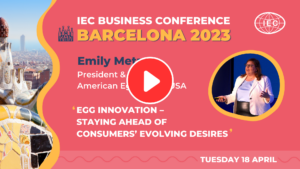Marketing excellence for eggs: Success stories from the US and Colombia
8 June 2023
At the recent IEC Business Conference in Barcelona, delegates gained a refreshing look at egg marketing insights and initiatives from two industry leaders. Presenting as part of the ‘Vision 365 and Power of Marketing’ session, Emily Metz, President and CEO of American Egg Board (AEB) and Gonzalo Moreno, the Executive President of FENAVI, shared concepts to support the global egg industry to enhance and refine their own egg marketing strategies.
Leading the narrative
 To commence the session, Emily took to the stage to discuss how AEB had leveraged negative press around inflation as an opportunity to shift conversations to positive: “We had to jump in feet first, we had to tell our story. We needed to add context, because if we didn’t that story was going to get told for us”.
To commence the session, Emily took to the stage to discuss how AEB had leveraged negative press around inflation as an opportunity to shift conversations to positive: “We had to jump in feet first, we had to tell our story. We needed to add context, because if we didn’t that story was going to get told for us”.
She described how their messaging emphasised that egg farmers are “price takers and not price makers”, and successfully shifted sentiment from negative to more neutral and balanced via a media blitz, garnering over 2,000 articles in a variety of news outlets over just four days. She highlighted the long-lasting impact of their communications, as the core messages continued to resonate even after initial coverage subsided.
Emily explained that AEB’s goal is to ensure the egg industry “not only survives, but thrives” despite challenges like rising costs, inflation, cage adversity, and HPAI. They utilised the White House Easter Egg Roll to amplify their messages through regional press, leveraging the Easter event that saw 30,000 attendees as a unique opportunity to share egg farmers’ stories in a breakthrough way. Their efforts were captured by local media, helping to build an emotional connection with consumers.
Sparking innovation – the Eggcelerator Lab
As part of her presentation, Emily was delighted to share AEB’s latest initiative, the ‘Eggcelerator Lab’ which was launched in October 2022: “The goal of the lab is to spark innovation by integrating cutting-edge insights and cultivating partnerships. Our mission is to drive demand”. The USA is embracing eggs as versatile ingredients with AEB at the forefront of transformative egg products.
She outlined how the initiative’s process has a heavy focus on “white space discovery work” to identify market opportunities. The work of the lab is fuelled by its network of manufacturers, suppliers, university researchers and subject matter experts that help to flesh out prototypes, she explained, resulting in a “library of hundreds of turnkey ideas, ready to share with clients”.
By investing in innovation upfront and offering a cost- and risk-reduced process to clients, AEB aims to accelerate the introduction of new and innovative egg-based products to the market. Referencing success stories from the project so far, Emily explained that by introducing these new products, they can drive demand and further reinforce the narrative that eggs should be inherent to daily diets.
Setting a strong foundation for growth
Next to present, Gonzalo Moreno provided background on Colombia by illustrating the recent significant growth in consumption per capita of eggs in his country, increasing from 212 in 2009 to 334 in 2021.
 He outlined the key factors contributing to this impressive consumption growth, highlighting the pivotal role that supply side improvements make to increasing consumption. Gonzalo noted that improved legislation surrounding sanitary standards, biosecurity and food safety had set the groundwork for strong, impactful communication strategies around eggs as a safe and healthy food. He added that a trade agreement with the USA in 2012, involving the exchange of corn imports and elimination of tariffs, had also facilitated significant production growth, enabling Colombia to match demand growth with supply.
He outlined the key factors contributing to this impressive consumption growth, highlighting the pivotal role that supply side improvements make to increasing consumption. Gonzalo noted that improved legislation surrounding sanitary standards, biosecurity and food safety had set the groundwork for strong, impactful communication strategies around eggs as a safe and healthy food. He added that a trade agreement with the USA in 2012, involving the exchange of corn imports and elimination of tariffs, had also facilitated significant production growth, enabling Colombia to match demand growth with supply.
Communicating the unique power of eggs
Gonzalo provided an overview of Colombia’s unique and wide-ranging egg marketing campaigns used to rewrite the narrative for eggs, which include a children’s cartoon TV show, ‘La Liga Supercrack’, and ‘The Gold Line to Life’ telephone counselling service, offering unlimited personalised nutrition advice to older adults. He explained that the main objective of these campaigns is to position the egg as the healthiest and most affordable protein in the country after years of negative press and disinformation.
Gonzalo added that strategic partnerships have reinforced marketing campaigns, further enhancing the reach and impact of FENAVI’s messages. One notable collaboration is with the Carlos Vives Foundation, who support social and sustainability initiatives in rural Colombia. In an overwater village, where food insecurity affects 96% of the population and malnutrition affects 95%, FENAVI, in partnership with the foundation, donated enough eggs for each person to consume at least one per day. Working alongside doctors, paediatricians, and nutritionists, FENAVI aims to improve the quality of life in the community. They will continue to track the positive health impacts in this village, which they hope will be a prime example of the incredible role eggs can play in improving nutrition.
FENAVI’s objective for this year is to increase per capita egg consumption to 365 units, the President of the organisation explained. They plan to do this through the reinforcement and promotion of sustainability and sanitary standards. Furthermore, FENAVI aims to explore how Colombia can position eggs as a nutrient-filled ingredient to add to foods through innovation, as well as an independent source of nutrition.
Hear from the experts first-hand
Understand the power of these campaigns and the passion behind them by watching Emily and Gonzalo’s presentations from IEC Barcelona. These recordings are available to IEC members only.

